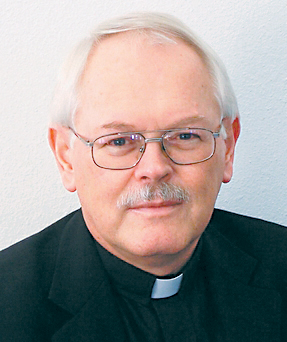By Ron Rolheiser, OMI
Andrew Greeley once suggested that we might profitably meditate on the following vision of heaven: The condition of physical ecstasy and emotional satisfaction which results from sexual intercourse between two people who are deeply in love is the best anticipation currently available to us of our permanent condition in the resurrected state. “The powerful inspirational value of sexual electricity and the awesome splendors of the human body will not be inhibited in the resurrected state as they are by the weaknesses of this world. The resurrection joys, then, will be interpersonal, physical, sexual, and corporate because we will enjoy them with each other.”
More than a few people are shocked by this kind of imagery when applied to heaven. However, it is precisely this kind of image which is prominent in the way a number of great Christian mystics, including John of the Cross and Theresa of Avila, describe heaven. For them, death is your wedding night.
Moreover, when one looks at how some of the prophets, notably Isaiah, fantasize about “the end times,” one sees a remarkable similarity between their vision of what constitutes salvation and the sexual imagery of the mystics. In both cases, in the end, the vision is one of wholeness, of consummation, of love without limit, of normal life turned upside-down, of a final peace that is ecstatic. For example, when Isaiah suggests that in the last times the wolf will lie down with the lamb, the panther with the kid, and the cow and the bear will make friends, even as the lion eats straw like the ox, and when he fantasizes the end times as a great banquet of all the best foods and the choicest wines, his fantasy is different only in image, not in substance, from what Greeley suggests. In both cases, a delicious and deeply sensual image is used to describe what things can be like, and will be like, if we are open to the gift of salvation.
I highlight these fantasies because too seldom are we ever taught that our fantasies, indeed even our sexual ones, can be the place where we intuit salvation. We are the privileged exception if we have been taught that our earthy fantasies can, potentially at least, be a rich source for spiritual insight and growth. How so?
In our favorite daydreams, we often picture some of the essential components of salvation, that is, our best fantasies are inevitably images of consummation and wholeness. In them, we are consummated and consummating, made whole and making whole, knowing fully even as we are known fully, face-to-face (as Paul describes this in 1 Corinthians 13: 12-13). In our daydreams, we never lack a life-giving embrace. In our dreams, we can unreservedly and truly make love.
Our best fantasies turn reality delightfully upside-down, wherein, as in Isaiah, lions eat straw like the oxen. In our daydreams, the normal rules of the world are suspended and we are able to perform great and noble things, irrespective of our own athletic, artistic, educational, or practical limitations. In our fantasies we are never limited by our body, race, education, background, situation, or intelligence. Nothing is impossible in our daydreams. In our fantasies we can fly—and be that one-in-a-million artist, novelist, athlete, movie star — and saint.
Moreover, in our fantasies there is justice and vindication. Just as the prophets imagined a great day of reckoning, when the arrogant will be brought down, the cruel will have to answer for their meanness, and the hidden virtue of those suffering silently will be revealed, so too in our daydreams. A good fantasy, in its own delicious way, always brings about justice. In our fantasies, we intuit a new heaven and a new earth.
Finally, in our healthy fantasies we are also always at our best and noblest. We are never petty, narrow, or small in our daydreams. There we are always paragons of virtue and nobility—generous, kind, deeply loving, and gracious.
Thomas Aquinas distinguished between two kinds of union. For him, you can be in union with something either through possession or through desire. In our fantasies, indeed even in those that are so sensual and private as to make us ashamed of them, we are given the privileged opportunity to intuit what salvation looks and feels like.
Sadly, the concept of heaven that comes to us through church preaching, catechesis, and Sunday school is often so bland, antiseptic, dualistic, asexual, and platonic that we do not want to trade this earthy life for it. Life here, for all its pains and frustrations, still appears richer and more exciting than the heaven that’s promised us after death. Fellowship with angels, perfect light, and the prospect of sitting in silence for all eternity worshipping God, while wonderfully correct and pregnant with meaning if understood, is too abstract to tempt us beyond the pleasures of this life.
Thus, we have something to learn from the biblical prophets, the mystics — and from the seemingly irreverent imagination of Andrew Greeley.







